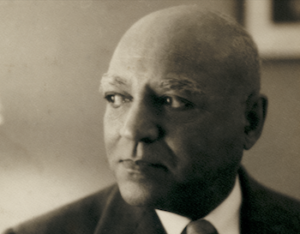
Lester Walton
*Lester Walton was born on this date in 1882. He was a Black composer, diplomat, and journalist.
Lester Aglar Walton, from St. Louis, MO, graduated from segregated Sumner High School. After graduation, his father provided him with a white tutor to help him graduate from a business school. Walton was an Alpha Phi Alpha fraternity member, the first intercollegiate Greek-letter organization established for Blacks.
As a journalist, he started as a golf writer at the St. Louis Star from 1902 until 1906. He also worked as a court reporter for the St. Louis Star. By 1908, Walton moved to New York and became a manager and theatrical editor for the New York Age. In 1912, Walton married Gladys Moore, daughter of Fred A. Moore, publisher of the New York Age. They had two daughters together.
Also, his arrival in New York City, and principally in Harlem, placed him right in the epicenter when he became the director of the Lafayette Theater, the only theater in the community at that time catering to an integrated audience. He was the theater’s director, the company’s songwriter and promoter, and wrote reviews for various productions. Walton was also a member of the music organization, the Frogs Club. During World War I, he was requested to supervise productions for Black troops. Later, he was elected vice president of the Negro Actors’ Guild and, in the 1950s, became chairman of the Coordinating Council for Negro Performers. In this capacity, he oversaw the integration of Blacks into every facet of the media.
His musical lyrics and direction were critical in productions like Joe Jordan’s “Rufus Rastus,” starring his friend Ernest Hogan and composer Will Marion Cook. In 1922, he was a touring manager for Harry Pace’s Black Swan Troubadours when they debuted with songs by Mamie Smith. Among his most popular compositions were “Welcome to New York,” a song dedicated to Mayor Robert Wagner, and “Jim Crow Got to Go,” often sung during the early days of the 60’s American Civil Rights Movement.
Walton's political doings began in 1913. With assistance from the associated press, he launched a movement for the universal spelling of the word Negro, to start with, the capital "N." He pursued a career in journalism, which helped him become a writer for The New York World from 1922 to 1931. In 1932, Walton returned to serve as an associate editor of the New York Age. He was also an active Democrat who served as publicity director in the Colored Division of the Democratic National Committee during 1924, 1928, and 1932. He attended the Versailles Peace Conference as a correspondent in 1920. Walton had a special interest in Liberia in 1933, visiting the country and writing an article for the Age and the New York Herald Tribune.
In July 1935, President Franklin D. Roosevelt appointed him the United States minister and was an advisor to the Liberian delegation to the United States from 1948 to 1949. Walton was an original member of New York Mayor Wagner’s Commission on Intergroup Relations, founded in 1955 by a New York City agency and later, in the 1960s, became known as the Commission on Human Rights. Walton held three honorary degrees: in 1927, he received a Master of Arts from Lincoln University in Pennsylvania. Later, in 1945, Walton received an LL.D. from Wilberforce University in Ohio. And in 1958, the University of Liberia presented him with an honorary LLD for his work for that nation.
When Walton walked the streets of Harlem, where he lived, he was often accompanied by many well-wishers and admirers. Many sought his influence in various community issues, particularly because he was a member of the Commission on Intergroup Relations, a city agency. He was Wagner's trusted confidant and worked extensively for Harlem in housing and community relations. In 1964, Walton retired from much of his work with the city; Lester Walton died on October 16, 1965, and his wife, Gladys, died in 1977.